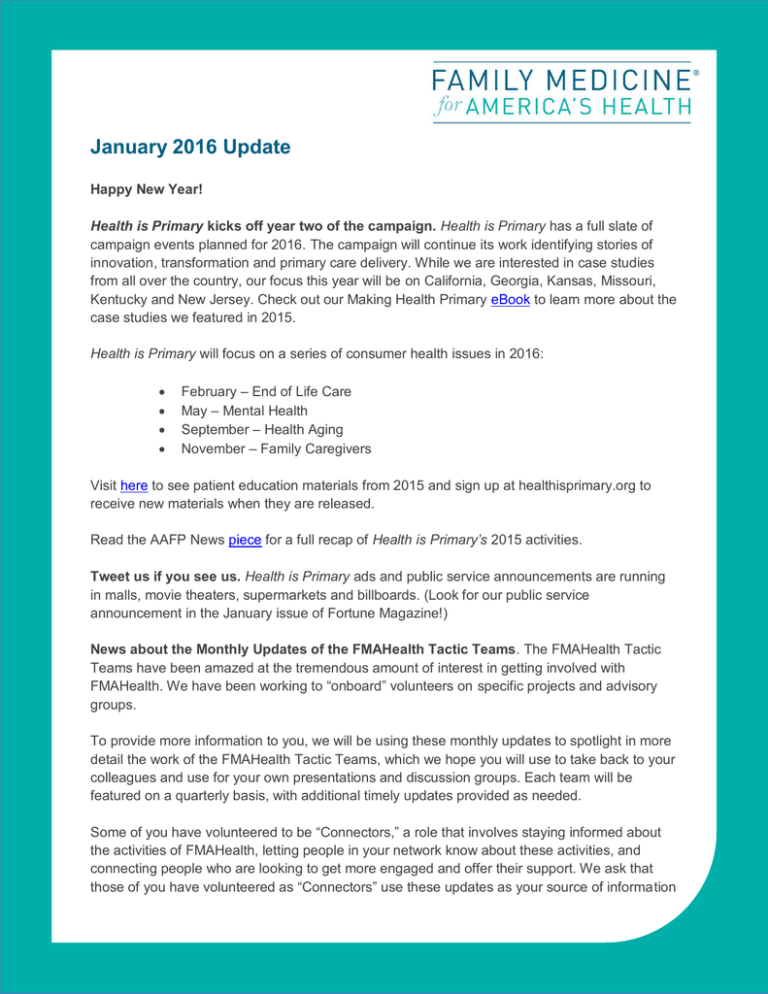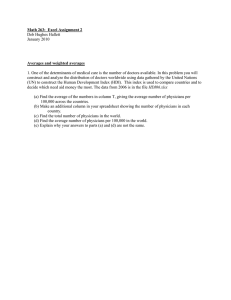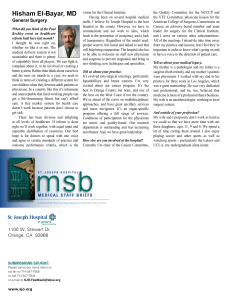January 2016 Update - Family Medicine for America`s Health
advertisement

January 2016 Update Happy New Year! Health is Primary kicks off year two of the campaign. Health is Primary has a full slate of campaign events planned for 2016. The campaign will continue its work identifying stories of innovation, transformation and primary care delivery. While we are interested in case studies from all over the country, our focus this year will be on California, Georgia, Kansas, Missouri, Kentucky and New Jersey. Check out our Making Health Primary eBook to learn more about the case studies we featured in 2015. Health is Primary will focus on a series of consumer health issues in 2016: February – End of Life Care May – Mental Health September – Health Aging November – Family Caregivers Visit here to see patient education materials from 2015 and sign up at healthisprimary.org to receive new materials when they are released. Read the AAFP News piece for a full recap of Health is Primary’s 2015 activities. Tweet us if you see us. Health is Primary ads and public service announcements are running in malls, movie theaters, supermarkets and billboards. (Look for our public service announcement in the January issue of Fortune Magazine!) News about the Monthly Updates of the FMAHealth Tactic Teams. The FMAHealth Tactic Teams have been amazed at the tremendous amount of interest in getting involved with FMAHealth. We have been working to “onboard” volunteers on specific projects and advisory groups. To provide more information to you, we will be using these monthly updates to spotlight in more detail the work of the FMAHealth Tactic Teams, which we hope you will use to take back to your colleagues and use for your own presentations and discussion groups. Each team will be featured on a quarterly basis, with additional timely updates provided as needed. Some of you have volunteered to be “Connectors,” a role that involves staying informed about the activities of FMAHealth, letting people in your network know about these activities, and connecting people who are looking to get more engaged and offer their support. We ask that those of you have volunteered as “Connectors” use these updates as your source of information and as a channel to engage your colleagues in the work of FMAHealth. If you need additional information or have questions about the information in these updates, please feel free to reach out to us at questions@fmahealth.org and we will get back to you quickly. The Practice Team’s focus is on developing the capability to meet physicians where they are in their practice transformation efforts and help them get to where they would like to go. The team’s mission is to help physicians rediscover the joy of practice and simultaneously meet the Triple Aim of better health, better care and better cost effectiveness. We’d like to showcase two projects on this update that are important to the Team’s overall effort. The Team is developing a survey tool to help them understand where physicians and practices are in their readiness for change. Much work has been done to help physicians understand patients’ readiness to change behavior – this effort seeks to help physicians better understand their own readiness as a starting point for exploring opportunities for improving their practice. The Team is also working to develop brief statements of the importance and value of practice transformation – called "elevator pitches”. These elevator pitches are written to influence multiple different stakeholders. For example, the pitch geared toward physicians emphasizes arguments for practice transformation that speak to physicians’ issues: • Improve the care of, and our relationships with, our patients • Decrease the hassle of practice • Enhance income through payment reform and reduction of the costs of providing primary care The next phase of the Practice team’s work will be to link pre-existing practice transformation resources to physicians based on where they are as they meet the many challenges of everyday practice. The Technology Team is currently working on two major projects. First, the team is developing a vision for how technology can promote health in the value-based world of 2020 and beyond. It is developing this vision in collaboration with some of the brightest minds in the healthcare technology sector. Once a draft is complete, it will seek input from a broad array of other organizations and individuals. Keep on the lookout for more updates about this exciting work soon. Second, it has created a listsev whereby health technology innovators can connect to forward thinking family physicians in order to get valuable feedback on their emerging solutions. The result will be twofold. First, solutions aimed at the primary care space that receive this feedback will be better able to assist family physicians as they work to achieve the Triple Aim. Second, it gives the Technology Team valuable insight into the cutting edge of health technology, further informing and strengthening the visioning work described above. If you would like to join the listsev, write to questions@FMAHealth.org and let us know you are interested. We will send you an onboarding questionnaire to get started. FMAHealth Board Forms a Cross-Tactic Team on Reducing Health Disparities in the United States. The FMAHealth Board has formed a cross-tactic team focused on the challenge of reducing health disparities in the United States. The team plans to collaborate with, and build on the work that the 8 family medicine organizations are already doing to help reduce health disparities in the United States. Reducing health disparities is one of seven strategic objectives agreed upon by those organizations as part of the FMAHealth Strategic Plan. (For more on the FMAHealth Strategic Plan see http://fmahealth.org/about.) The team, composed of one member of each of the 6 Tactic Teams, is chaired by Viviana Martinez-Bianchi, M.D FAAFP, Assistant Professor and Residency Program Director at Duke Department of Community and Family Medicine. The cross-tactic team will help FMAHealth make reducing health disparities a concrete part of all of its work. The team is also collaborating with the University of California San Francisco Department of Family and Community Medicine. The department, chaired by Kevin Grumbach, MD, has built a strong research capability dedicated to reducing health disparities. The team looks forward to learning from them as well as from others, including minority groups and underserved people throughout the country. We will be back in touch in future monthly updates as the team clarifies its charge with the FMAHealth Board and builds out its workplan for 2016.



